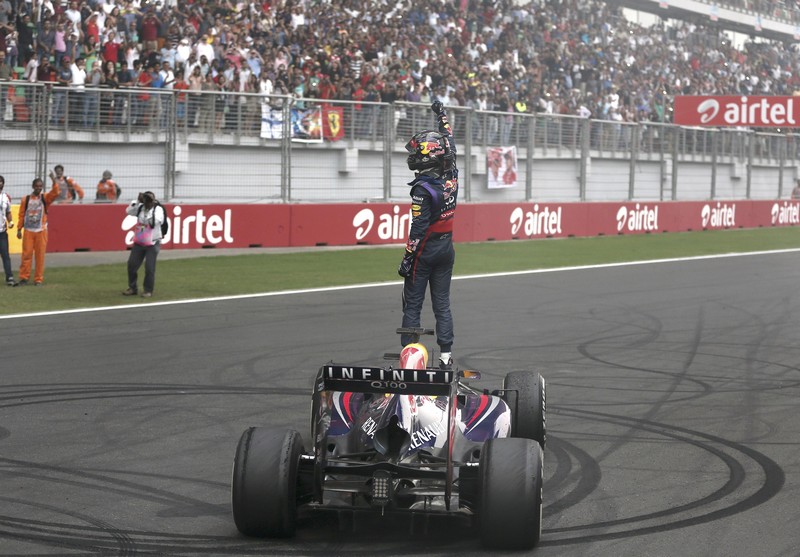It remains to be seen whether Sebastian Vettel's championship coronation was the final Indian Grand Prix. What we know so far is that the third edition of the event was the last for at least a year, with a sketchy plan currently in place for the race, held in the Greater Noida suburb of Delhi, to return to the calendar in the first part of 2015.
A combination of local bureaucracy, currency fluctuations, a lack of direct government funding and tax issues have been blamed, the latter in particular causing real problems for Jaypee Sports International, the private company which promotes the race. The government's decision to class Formula One as 'entertainment' rather than 'sport' – a generous interpretation, as several wags pointed out, given the spectacle at times this year – has resulted in Jaypee being taxed to a much greater level. Where sport in India is tax exempt in several areas, entertainment events are not. Building a large fanbase for the sport has also proved a slow-burner. The official word on attendance for Sunday's race was, perhaps inevitably, vague, pegged as it was at around 60,000. For comparison, 95,000 people attended the first race at Buddh International Circuit in 2010 and around 65,000 returned for the second race last year.
Rosberg on the Magic Bus
Nowhere on the Formula One calendar is there a more jarring contrast between the gleaming paddock and the surrounding areas, a fact which makes more than a few more than a little uncomfortable. Before the race weekend began, though, Nico Rosberg took some time out to show 20 local youngsters around the world of Formula One, as part of his duties as an ambassador for Laureus. The Mercedes driver joined the Magic Bus, which has reached out to 250,000 children across India. It is one of 140 projects Laureus supports, and has raised €60 million for, around the world. “Sport is so effective in inspiring young people and giving them hope for the future,” said Rosberg, amongst the most well-rounded drivers on the Formula One grid. “Nowhere is this more true than in India where so many children have to struggle from the day they are born. I was pleased I was able to meet the guys and talk to them. I took the chance to show them around on my working desk in the team’s garage. I think they were amazed by the whole day and I hope they will be inspired by the visit and become role models for the other young people at Magic Bus.”
Chime to party
Confirmation of Vettel's world title apart, the biggest Formula One-related story of the weekend occurred thousands of miles from the Buddh International Circuit. On Friday, Chime Communications confirmed it had acquired Just Marketing International (JMI), the agency which has been at the forefront of some of the largest sponsorship deals in recent Formula One history Formula One.
Under the stewardship of founder Zak Brown, JMI has brought the likes of UBS, UPS, Unilever and GlaxoSmithKline into the sport since 2010 – vital new sources of revenue for teams in straitened times. As a result of the US$76 million deal, JMI will now become part of Chime's CSM Sports & Entertainment division, with Brown retaining his role as chief executive. The man himself told SportsPro that it was “love at first sight”, adding that the tie-up with Chime is “like sticking a turbo on our engine”.
In praise of Christian Horner
Amidst the fully deserved praise for the impeccable Vettel – the model for the ideal modern-day Formula One driver – and the consistent brilliance of the man who has, since 2009, designed his cars, Briton Adrian Newey, it is easy to overlook the qualities of the third member of Red Bull Racing's leadership dream team. Christian Horner was appointed team principal by Red Bull founder Dietrich Mateschitz in 2005. Still only 39, he is now presiding over an era of domination, deftly managing not only the team, based in an innocuous industrial estate in Milton Keynes, but the near-constant media duties over every Grand Prix weekend, not to mention satisfying his occasionally difficult paymasters back in Austria.
Four successive championship doubles suggests he has been pretty successful at the balancing act. “You're running a business from Monday to Friday,” Horner told SportsPro before the start of this season, “and then you're running a sports team for 20 weekends of the year, managing that sports team and having to sign off on all the key and tactical decisions – and on top of that deal with the media and public scrutiny there is on the sport. But that's part of the challenge, that's part of the fun of what the role is.” He may not quite make as many headlines as Vettel or even Newey, but Horner has undeniably played his part.

